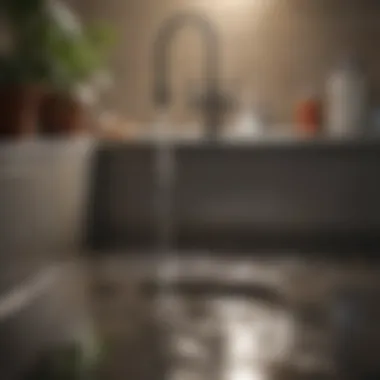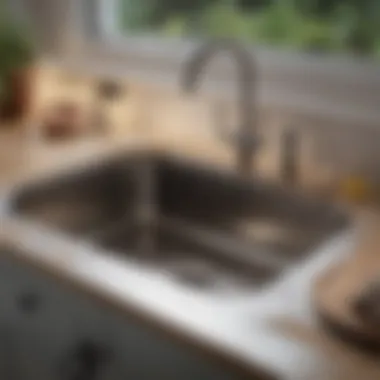Eco-Friendly Techniques to Clean Your Kitchen Sink Drain


Intro
Keeping your kitchen sink drain clean might not be the first thing on your mind when it comes to home maintenance, but it’s a vital aspect of a healthy kitchen. A neglected drain can become a breeding ground for unpleasant smells, clogs, and bacteria. The good news? You don't need a cabinet full of harsh chemicals to tackle these issues. In this article, we’ll explore a cornucopia of natural solutions that not only help in cleaning your kitchen sink drain but also contribute to a sustainable home environment.
Imagine walking into your kitchen and without any unwelcome odours greeting you. More than just a chore, caring for your sink’s drainage system enhances your kitchen’s overall ambiance. Plus, the steps we’re going through involve ingredients you likely already have at home.
In a world that increasingly values eco-friendly home practices, understanding how to maintain your kitchen drain naturally is both a practical skill and a step toward more sustainable living.
Understanding Kitchen Sink Drains
The kitchen sink drain is often the unsung hero of your household. It plays a critical role in maintaining the cleanliness and overall functionality of your kitchen. By understanding how kitchen sink drains operate, you can troubleshoot issues more effectively and protect your space from unpleasant experiences, like stubborn odors or slow drainage.
Typical Problems with Kitchen Sink Drains
Nearly every kitchen experience has its share of drainage dilemmas. Here are some common culprits that can lead to headaches:
- Clogged Drains: This is the biggest troublemaker, often caused by food particles, grease, or soap buildup. You might notice your water pooling in the sink like a mini lake, which can quickly become an annoyance.
- Bad Odors: A sink drain harboring decomposing leftovers or organic material emits a foul smell. If you start getting whiffs of something not-so-fresh, it’s time to take action.
- Gurgling Sounds: When water struggles to escape, it can create gurgling noises—like your sink just ate a bad meal. This usually indicates a blockage somewhere in the drain line.
- Slow Draining Water: If your water seems unwilling to leave your sink, it signals that something’s holding it back. This is often a sign of buildup in the drain or issues further down the line.
Understanding these issues helps in not waiting until it hits you like a ton of bricks. Addressing them early saves time, money, and a lot of frustration.
Why Choose Natural Cleaning Methods
In this modern age, more and more people are shifting toward natural cleaning methods, and for good reason. Here are some points to consider:
- Safety: Traditional cleaning chemicals can be harsh and pose risks, especially if you have pets or kids scurrying around the house. Natural products, like baking soda and vinegar, are generally safe for all members of the family.
- Environmentally Friendly: With increasing awareness of our ecological footprint, utilizing natural solutions minimizes harm to our planet. These ingredients often break down easily and don't leave behind toxic residues.
- Cost-Effectiveness: You might find that the magic of cleaning lies within your pantry, making it easy on the wallet. With just a few staples, you can whip up powerful solutions without dishing out for expensive chemical cleaners.
- Effectiveness: Don’t underestimate the power of natural cleaners—they can be just as efficacious as their chemical counterparts. They can break down grease, eliminate foul odors, and keep your drain flowing smoothly.
The Importance of Maintenance
Kitchen sink drains are often the unsung heroes of modern households, quietly whisking away the remnants of our daily meals and dirty dishes. Yet, like any vital component of your kitchen, they demand attention and care. Proper maintenance is not just a luxury; it’s a necessity that ensures functionality and hygiene. Failing to maintain your kitchen sink drain can lead to unpleasant odors, inconvenient clogs, and unsightly messes that are neither welcoming nor hygienic.
Regular Cleaning Routines
Establishing a regular cleaning routine for your kitchen sink drain is akin to preventative medicine—it's cheaper and easier than dealing with complications down the road. Ideally, set aside a few minutes each week to tend to your drains. This simple practice can help minimize the buildup of food particles, grease, and soap scum.
- Daily Steps: After washing dishes, run hot water down the drain. This helps dissolve fats and clear any minor debris. Additionally, consider giving your sink a quick scrub with natural cleaners to keep it fresh.
- Weekly Rituals: A thorough cleaning each week can involve using baking soda followed by vinegar. This combination enhances cleanliness while also deodorizing and breaking down clogs over time.
- Monthly Deep Cleans: Once a month, treat your drain to a more significant cleaning with salt and lemon juice, or even a blend of baking soda and vinegar. This acts as a powerful effervescence that not only cleans but also refreshes the entire drain system.
By incorporating these steps into your routine, you’re taking a proactive approach that pays dividends in the long run.
Signs of a Clogged Drain
Recognizing the signs of a clogged drain is crucial. Sometimes, the symptoms can be subtle, but catching them early can save you from future headaches. Here are some telltale signs to watch for:
- Slow Draining Water: If you notice that water isn’t going down as swiftly as usual, this is often the first sign that something might be amiss.
- Unpleasant Odor: Bad smells emanating from your sink can indicate food accumulation or bacterial growth that requires immediate attention.
- Gurgling Sounds: If your drain makes odd gurgling noises when in use, it could be a cry for help signaling a buildup of air or water, hinting at a blockage further down the line.
"A stitch in time saves nine." It’s a little cliché, but it holds truth in this case – addressing these signs quickly can save you from more arduous repairs.
In summary, the importance of maintaining your kitchen sink drain cannot be overstated. By being attentive to regular cleaning and cognizant of signs indicating trouble, homeowners can preserve their kitchens' functionality and cleanliness, creating a healthier environment for themselves and their families.
Natural Ingredients for Cleaning


Cleaning your kitchen sink drain might seem like a mundane task, yet it plays a crucial role in maintaining hygiene and functionality in the home. When considering natural ingredients for cleaning, it becomes clear that these elements not only tackle the buildup of grease and grime effectively but also contribute to a healthier living environment. The essence of using natural solutions lies in their non-toxic nature, promoting both personal safety and a reduced environmental footprint. This article will discuss several of these ingredients that have stood the test of time, proving effective while being gentle on the earth.
Baking Soda as a Cleaning Agent
Baking soda is somehow a household staple, known for its versatility in cooking and cleaning. As a mildly alkaline substance, it functions as a gentle abrasive, perfect for scrubbing away stubborn residues in your sink drain. When baking soda comes into contact with acidic substances (like vinegar), a chemical reaction occurs, producing carbon dioxide and water. This fizzing effect can help dislodge clogs, which is particularly useful if you find yourself encountering stubborn blockages.
- Benefits:
- Deodorizes odors by neutralizing acids
- Cuts through grease without scratching the surface
- Inexpensive and widely available
In short, using baking soda in conjunction with other natural agents can lead to a noticeable improvement in the cleanliness of your kitchen sink drain without the need for harsh chemicals.
Vinegar: The Multipurpose Cleaner
Vinegar, particularly white vinegar, is another natural cleaning agent worthy of mention. Renowned for its effectiveness in dissolving mineral deposits, vinegar can work wonders on your kitchen sink drain. The acetic acid in vinegar is potent against soap scum and buildup, making it a powerful ally in cleaning tasks. Unlike many chemical cleaners, vinegar leaves no harsh chemical residue, making it a safe and preferred choice for many households.
To use this natural cleaner, simply pour it down the drain and allow it to sit for a few minutes before flushing with hot water.
- Advantages:
- Antimicrobial properties help eliminate bacteria
- Absorbs and neutralizes unpleasant odors
- Safe for septic systems
"Vinegar is to cleaning what a Swiss Army knife is to tools; it’s just that versatile."
Lemon Juice for Freshness
The fresh scent of lemon juice is a natural deodorizer that has been celebrated for its purifying properties. Beyond its invigorating aroma, lemon juice contains citric acid, which contributes to its natural cleaning prowess. The acidity of lemon juice can be effective in removing stains and freshening up your kitchen sink drain, setting a pleasant atmosphere in one of the most frequently used spaces in your home.
Incorporating lemon juice into your cleaning routine can elevate the experience, often making the task feel less laborious, and downright enjoyable.
- Key Points:
- Its antibacterial properties assist in disinfecting surfaces
- Leaves a bright, clean scent
- Lemon peels can also be put down the disposal for enhanced freshness
Salt for Abrasion
Salt might seem like a simple kitchen item, yet it serves as a powerful cleaning agent; especially when it comes to abrasive cleaning. Its gritty texture makes it an excellent scrubber, which can help dissolve sticky or greasy build-ups in sink drains. Salt is particularly effective when combined with other components, such as vinegar or lemon juice.
- Features:
- Acts as a natural abrasive without causing damage
- Help to reduce odors
- Easy and inexpensive to use
Using salt in conjunction with other natural ingredients can lead to a cleaner, more efficient kitchen sink drain, reflecting the value of incorporating natural solutions into your cleaning arsenal.
Step-by-Step Cleaning Techniques
When it comes to maintaining a clean kitchen sink drain, having a set process is invaluable. Not only does it ensure thorough cleaning, but it also builds a routine that can prevent future blockages. By following a step-by-step approach, you can be sure that each area is addressed and no part is left to chance. Sometimes, the simplest techniques can yield the most remarkable results, and hence knowing these steps can save you both time and money in the long run.
Preparing the Sink for Cleaning


Before diving headfirst into the cleaning process, preparation is paramount. Begin by removing any visible debris from the sink. This means clearing out leftover food particles, bits of grease, or any other gunk that has settled. Use a damp cloth to wipe down the surfaces, ensuring that everything is clean and ready for the natural cleaning solutions. You want to create a blank canvas so that the cleaning agents can work effectively. Also, plug the sink with a stopper to contain the concoction you will use.
Using Baking Soda and Vinegar
One of the most effective methods in the arsenal of natural cleaning solutions involves a dance of baking soda and vinegar. Their synergy breaks down build-up, making it a popular choice for many households looking to freshen up their sinks.
Mixing the Ingredients
This is where the magic starts. Take about half a cup of baking soda and the same amount of white vinegar. When mixing them, you’ll notice a fizzing action—this bubbling is a chemical reaction that helps lift stubborn stains and blockages. The beauty of this mix lies in the fact that it tackles grease while being gentle on your plumbing. It is a popular choice because it’s easy to find these ingredients in any kitchen, and they are safe for the environment, which adds to its appeal.
Pouring into the Drain
After you create that satisfying bubbly mix, it’s time to pour it down the drain. This is crucial because if done right, the solution will travel through the pipes and start breaking down anything that has gathered over time. Be deliberate when pouring; you don’t want to splash it around but rather direct it right down the drain. This method also highlights the strong cleaning properties of both baking soda and vinegar, which tackles odor and buildup simultaneously.
Dealing with Foaming Reaction
The foaming reaction is an interesting sight to see in action. This bubbling continues for several minutes and is a sign that the mixture is working on breaking down the grime. However, allow it to sit for at least 15 minutes for maximum effectiveness. It’s advisable to run hot water down the drain afterwards to flush away any loosened debris. While everyone loves a good show, be aware that too much foaming can cause clogs if not managed properly.
Lemon and Salt Scrub Method
Another nifty duo for cleaning involves lemon and salt. This method not only cleans but also leaves a refreshing scent that can brighten up any kitchen.
Slicing the Lemon
Start by cutting a lemon in half. Lemons serve as a natural degreaser, and their acidity helps in breaking down stains. The best part about using lemons is that they smell fantastic, which makes the cleaning process feel less like a chore. When you slice the lemon, you expose the juicy, acidic interior that works wonders on stubborn grime and odors. This simple step packs a punch in the effectiveness of this natural solution.
Coating with Salt
Once the lemon is sliced, take some salt and coat the flesh of the lemon half before starting to scrub. The salt acts as a gentle abrasive that enhances the cleaning process without damaging surfaces. Just imagine how this combination tackles both grease and crusty residue, making it a beneficial choice especially for those who want minimal fuss without harsh chemicals. Salt’s properties also help to deodorize, ensuring your drain doesn’t just look clean but smells fresh.
Scrubbing the Drain
Finally, the fun part comes when you take that salt-coated lemon and scrub it around the area of the drain. As you scrub, the abrasive action, combined with the lemon’s juices, breaks apart residues. You’ll not only clean the drain effectively, but the natural oils released from the lemon leave a lingering freshness behind. This method is unique in that it marries cleaning with a delightful scent, making it a charming option for those who enjoy a pleasant kitchen environment.
Preventive Measures
Preventive measures play a crucial role in maintaining a clean kitchen sink drain. It’s always easier to stop a problem before it starts, isn’t it? Regular maintenance can save you the hassle of dealing with stubborn clogs and foul odors later on. This section delves into two effective strategies: the regular use of natural cleaners and installing a drain strainer. Each approach enhances the longevity of your sink's functionality and keeps those inconvenient plumbing issues at bay.
Regular Use of Natural Cleaners
Incorporating natural cleaning products into your routine is like giving your kitchen sink drain a daily dose of vitamins. Using ingredients like baking soda and vinegar not only promotes a fresh environment but helps eliminate grease buildup and unpleasant odors. Here’s how this daily habit can make a difference:
- Odor Control: Regular application can neutralize strong food smells that tend to linger in drains. Nothing turns you off more than that week-old fish scent sneaking up on you during meal prep.
- Grease Buildup Prevention: A good rule of thumb is to target those greasy deposits before they harden and turn into a major blockage. A simple monthly mix of baking soda and vinegar can help keep your pipes flowing smoothly.
- Eco-Friendly Choice: Utilizing natural products over harsh chemicals not only benefits the health of your household but also protects the environment. This is especially relevant as we all strive to be more conscientious about our ecological impact.
It’s important to establish a routine. Consider marking it on your calendar or setting a monthly reminder.
Installing a Drain Strainer
A drain strainer, often overlooked, can do wonders for your kitchen sink drain. Think of it as a protective barrier against the larger food particles that can lead to pesky clogs. Here’s why you should invest in one:


- Blocking Food Debris: Forking out extra chunks of food or vegetable scraps that might slip down the drain becomes a thing of the past. A strainer catches the majority, letting water flow freely while you clean up after meals.
- Easy to Clean: Most strainers are dishwasher safe. Simply rinse it off or give it a quick clean by hand, and you’re good to go. This frequent cleaning is a small price to pay for preventing major drain issues down the line.
- Cost-Effective Solution: With the relatively low cost of drain strainers, it’s a no-brainer really. Avoiding a huge plumbing bill by preventing a clog doubles as a smart financial move.
In essence, preventive measures are the unsung heroes of kitchen maintenance. A little effort today can save you considerable headaches tomorrow. If you think ahead, you'll find everything flows much better!
Implement these preventive measures, and you’ll not only be enhancing your kitchen sink’s performance but also fostering a cleaner and more pleasant cooking space.
Environmental Considerations
Cleaning your kitchen sink drain isn't just about the immediate task at hand; it's part of a broader conversation regarding the impact our habits have on the environment. As homeowners, many of us aspire to create and maintain spaces that are not only aesthetically pleasing but also sustainable. This section delves into why opting for natural solutions in cleaning your kitchen sink drain matters, highlighting both the ethical and practical benefits of these choices.
Benefits of Using Natural Ingredients
When it comes to cleaning, natural ingredients offer a wealth of advantages. First off, substances like baking soda, vinegar, and lemon juice are generally non-toxic. This means it's much safer for your loved ones—especially for those who might have allergies or sensitivities—to be around while you tackle that troublesome drain. In fact, using these natural alternatives can often lead to enhancing the air quality in your home since they don't emit harmful fumes like some chemical cleaners do.
- Healthier Homes: By keeping harsh chemicals out of your cleaning routine, you’re making your living space healthier.
- Biodegradable: Most natural cleaners break down over time, reducing the impact on our planet's ecosystems.
- Cost-Effective: Natural solutions can be found right in your kitchen pantry, saving you money on expensive, branded cleaners.
As you consider these benefits, it’s clear that natural ingredients do more than just clean—they contribute to a more responsible approach to maintaining your home.
Comparing Chemical Cleaners and Natural Solutions
It’s easy to reach for the industrial-strength solutions at your local store, but what’s often overlooked are the long-term ramifications of these choices. Chemical cleaners can indeed clear a clogged drain, but they come with significant drawbacks. They might work like a charm to dissolve grease and grime, but they’ve got their own set of challenges that can’t be ignored.
- Toxicity: Many cleaning products contain harmful substances that can be detrimental to both your health and the environment.
- Environmental Impact: The manufacturing process of these products often produces significant waste and pollution, contributing to the larger issue of environmental degradation.
- Corrosive Effects: Prolonged use of chemical cleaners can damage your plumbing over time, which leads to costly repairs.
In stark contrast, natural solutions offer a gentler alternative with fewer negative effects on your plumbing and environment.
As you weigh your options, consider the lasting effects of your cleaning methods—not just on your home, but on the planet as well. Natural solutions provide a clear pathway to maintain a clean kitchen sink drain while also endorsing a more sustainable lifestyle.
"Choosing natural cleaning methods is not only about removing the grime, but also about fostering a healthier environment for generations to come."
Using natural solutions is a conscious step towards better home maintenance and environmental stewardship. By adopting these practices, you will not only be shaping a cleaner space but also contributing positively to the world outside your door.
Ending
Many homeowners may feel overwhelmed when faced with a clogged kitchen sink or unpleasant smells emanating from it, but adopting these natural cleaning strategies can ease that burden. Not only are these methods cost-effective, but they also contribute to a healthier home and planet. By proactively maintaining your kitchen sink using the steps provided, you'll cultivate a cleaner, fresher kitchen space while prioritizing sustainability.
Recap of Efficient Cleaning Strategies
Let’s take a moment to recap the efficient cleaning strategies discussed in this article:
- Baking Soda and Vinegar: A classic combination that uses an acid-base reaction to break down debris.
- Lemon Juice and Salt Scrub: This method harnesses natural acids and abrasiveness for a refreshing clean.
- Regular Cleaning Routines: Consistency is key; integrating these methods into your maintenance schedule will keep your drains flowing smoothly.
- Preventive Measures: Using strainers and regular treatments will save you from bigger clogs down the line.
These strategies not only tackle existing problems but also help prevent future build-up, making them indispensable tools in your cleaning arsenal.
Encouraging Sustainable Practices
In addition to keeping your kitchen clean, it’s vital to pay attention to the broader implications of your cleaning choices. Utilizing natural solutions is not just a personal preference but a call to action for a more sustainable lifestyle.
Here are some considerations that can guide your sustainable practices:
- Environmental Impact: Natural cleaners are typically biodegradable and less harmful to aquatic life when they enter wastewater systems.
- Reducing Chemical Use: By cutting down on commercial chemical cleaners, you minimize the risk of exposure to potentially harmful substances.
- Supporting Local Ingredients: When you choose ingredients like baking soda, vinegar, or citrus, you're often supporting products that are readily available and inexpensive, promoting local economies.
"The small changes we make in our homes echo into the broader environment. Every natural solution we opt for is a step towards preserving our planet."
Adopting these practices doesn't just improve your home; it's a ripple effect that can impact your community and the world at large. Ultimately, it's about nurturing a healthier environment for future generations while enjoying the fresh and inviting aura of a clean kitchen.



